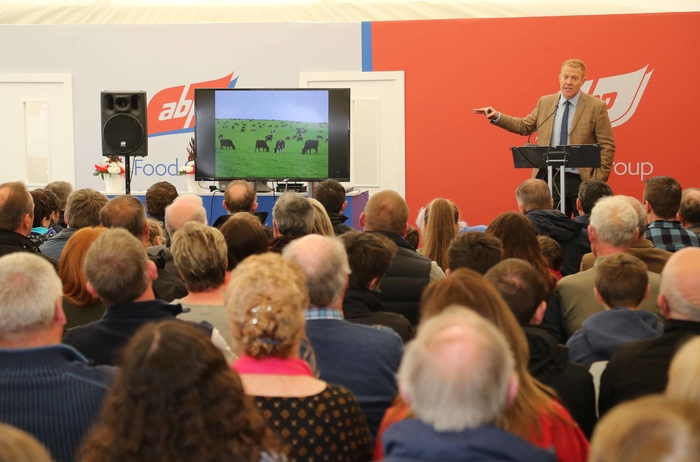In the last of three podcasts, Cotswold farmer and TV presenter, Adam Henson, speaks to Reading University’s Professor Chris Reynolds, one of the world’s leading specialists on ruminant nutrition and physiology, and to Andrew Macleod, ABP’s Shropshire demonstration farm manager.
The conversations explore the science behind the measurement and management of emissions from beef herds, and how ABP is undertaking practical on-farm research to provide practical ‘how to’ advice for farmers to reduce their emissions.
“Within these rich conversations we explore how genetics, nutrition and new technologies can further bolster Britain’s already strong environmental credentials when it comes to beef production,” Mr Henson says.
“The combination of speaking to Chris Reynolds about his work with ABP to apply his research knowledge to the challenge of methane emission reduction was very enlightening, because he gave invaluable insight into ABPs on-farm findings and recommendations for practical and meaningful changes to reduce emissions from changes in farm practice.”
In his interview with ABP Farm Manager Andrew Macleod, Adam asked how the farm is managed, the animals that are reared, managed and, importantly, how the colossal amount of data on performance and physical emissions are recorded. Andrew has been managing ABP Bromstead since it was opened as a development farm five years ago; he originates from Easter Ross in the north of Scotland.
Mr Henson said: “Andrew manages the farm, the measuring and monitoring and the technologies that ABP is investigating. The tech includes ZELP collars which neutralise exhaled methane from cattle, green feed bins and weigh bins which measure individual animal’s feed consumption.
“The ABP team and partners capture every bit of data possible to determine how every animal differs, how feed rations impact methane production and how the use of a range of technologies and farm management system adaptations can all play their part in emission reduction.”
It’s not just the data from ABP’s two development farms that informs their partners – ZELP, Harper Adams, Reading and Genus, to name but a few – all beef animals that are processed at an ABP abattoir are graded using Video Imaging Analysis (VIA), the results from which are fed back to ABP’s genetics partner. This carcase weight and grading data is used to determine the relative performance of sire and breed; added to this, the farm’s research findings identify the best beef sires, the most methane-reducing sward types and the optimum slaughter age and weight.
At the farm ABP’s team also works closely with Harper Adams University and Dr Jude Capper, ABP’s Chair and Professor of Beef and Sheep.
Mr Henson adds: “The podcasts really do give the industry a current and practical insight into how reducing greenhouse gas emissions can be achieved. The conversations clearly define that what happens on farm matters when it comes to emissions reduction, because 78% of greenhouse gas emissions in the beef supply chain are linked to live cattle.
“In the British Isles we are already producing some of the most environmentally positive beef in the world, however, like every industry we have more gains that we can make. There are so many practical and doable changes we as farmers can make to play our part – many of which we have talked about within the series.”
The Sustainable Beef Podcast is available on all the usual channels.
Link to podcast: https://podcasts.apple.com/gb/podcast/adam-henson-digs-into-the-science-and/id1522852419?i=1000553422014


